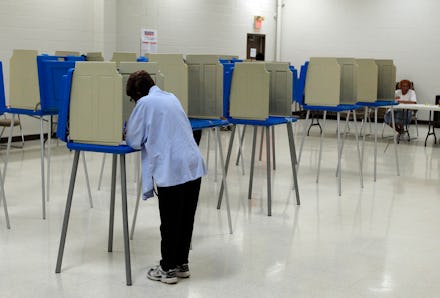A New Study Proves What Liberals Have Said All Along About Voter ID Laws

The news: In the December issue of Perspectives on Politics, Keith G. Bentele and Erin E. O’Brien, two professors from UMass Boston, address the issue of voter fraud and voter access policies. Without preconceptions, they look into recently-passed voter identification laws and their effects on turnout. Their findings suggest that restrictive voting policies unjustly target minorities and impact them in just about every way the democratic rhetoric of recent years has suggested.
They identified a few patterns in the states where this type of legislation is more likely to be enacted – in fact, restrictions on voting are overwhelmingly popular in states with larger minority populations, especially non-citizens and African-Americans, and states that have had larger minority turnouts at the polls in previous elections.
The background: Generally speaking, these types of laws require people to bring some type of document or take some type of test in order to cast their ballot. For years, Democrats and Republicans have squabbled over voter verification requirements. Most Democrats feel that such legislation is partisan and aims to reduce minority (and especially African American) voter turnout. In other words, these laws limit those demographic groups that have historically voted Democrat from having free and equal access to the polls. Republicans counter that there are legitimate reasons to fear voter fraud in many of these areas, and thus voting requirements should be more stringent. While Bentele and O’Brien acknowledge that there are other important variables — 83% of the laws on voter registration passed between 2006 and 2011 were passed by Republican-controlled legislatures, for example — their findings remain irrefutable.
The takeaway: In February, the Supreme Court’s decision in Shelby County v. Holder, struck down crucial provisions of the Voting Rights Act that required certain districts to obtain federal clearance before changing voting laws, based on their history of discrimination. The decision was controversial and widely protested. In the light of these new findings, we should seriously reconsider voting policies in low-income and minority-heavy areas. While there are other variables to consider, this report presents the nation with the unique chance to re-evaluate these controversial measures. Together with re-districting, voter registration laws provide the opportunity for politicians to selects their constituents, rather than having their constituents select them. Regardless of whether you identify as a Democrat or as a Republican, the current system seems unfairly prejudicial, and, quite frankly, un-American.